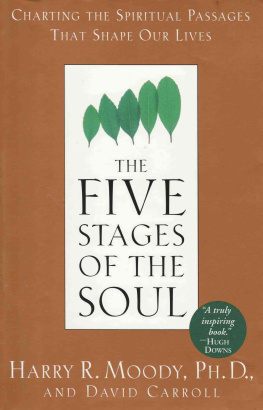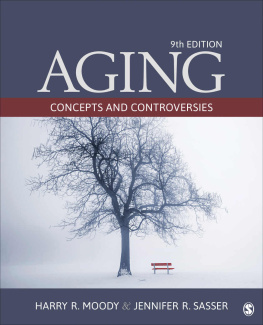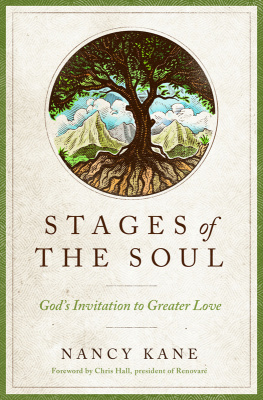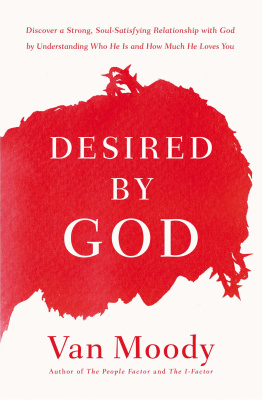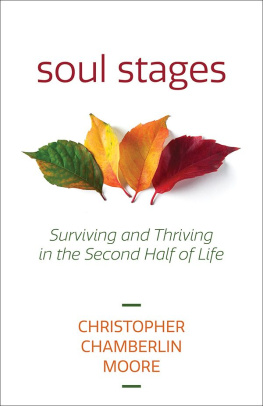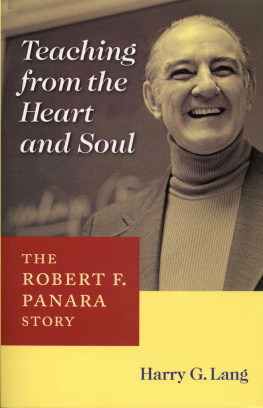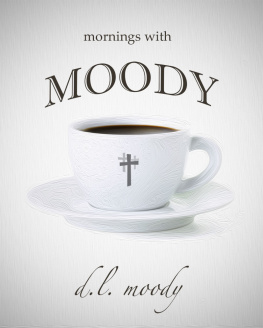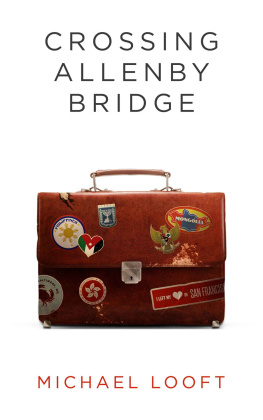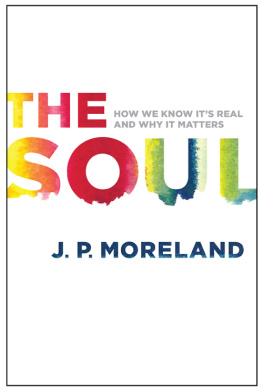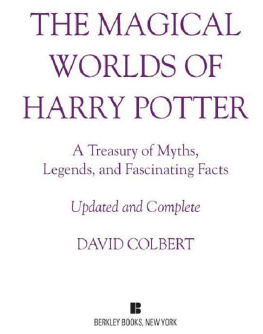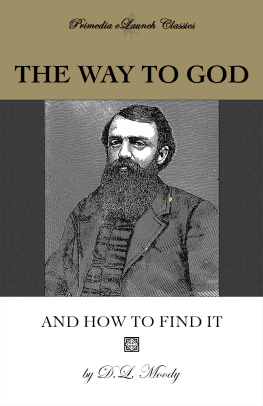Harry R. Moody - The Five Stages of the Soul
Here you can read online Harry R. Moody - The Five Stages of the Soul full text of the book (entire story) in english for free. Download pdf and epub, get meaning, cover and reviews about this ebook. genre: Religion. Description of the work, (preface) as well as reviews are available. Best literature library LitArk.com created for fans of good reading and offers a wide selection of genres:
Romance novel
Science fiction
Adventure
Detective
Science
History
Home and family
Prose
Art
Politics
Computer
Non-fiction
Religion
Business
Children
Humor
Choose a favorite category and find really read worthwhile books. Enjoy immersion in the world of imagination, feel the emotions of the characters or learn something new for yourself, make an fascinating discovery.
- Book:The Five Stages of the Soul
- Author:
- Genre:
- Rating:4 / 5
- Favourites:Add to favourites
- Your mark:
- 80
- 1
- 2
- 3
- 4
- 5
The Five Stages of the Soul: summary, description and annotation
We offer to read an annotation, description, summary or preface (depends on what the author of the book "The Five Stages of the Soul" wrote himself). If you haven't found the necessary information about the book — write in the comments, we will try to find it.
The Five Stages of the Soul — read online for free the complete book (whole text) full work
Below is the text of the book, divided by pages. System saving the place of the last page read, allows you to conveniently read the book "The Five Stages of the Soul" online for free, without having to search again every time where you left off. Put a bookmark, and you can go to the page where you finished reading at any time.
Font size:
Interval:
Bookmark:
The Five Stages
of the Soul
Acknowledgments
The foremost acknowledgment here is to one person and one person above all: to David L. Carroll, my co-author, who helped find the words and the voice to tell the story of the five stages of the soul in these pages. A word like "collaboration" cannot begin to describe the mysterious process whereby two minds become one, nor does the word gratitude begin to express my feelings to David.
I want to thank those who read parts of the manuscript in progress: Bob Atchley; Hannah Carroll; Joe and Jaird de Raismes; David S. Hobler; Marilyn Howard; Esther and Patrick Quinlan; Andy and Melanie Rock; and most of all to my wife, Elizabeth.
This book would not have been possible without the early and continuing confidence of Madeleine Morel and Barbara Lowensrein of Lowenstein-Morel Associates. Special thanks also go to Roger Scholl, editor at Doubleday, whose helpful suggestions, insightful criticisms, and tireless support were invaluable for making a better book. Thanks, too, to Monsignor Charles Fahey, former director of the Third Age Center at Fordham University.
I owe an enormous debt to those who have been so supportive to me over many years: above all, to Rose Dobrof, Brookdale Professor of Gerontology at Hunter College and Founder of the Brookdale Center on Aging, as well as to key staff at the Brookdale Center, especially Sam Sadin, Pat Gilberto, and Mollie Muller. The Brookdale Foundation has supported the work of the Brookdale Center at Hunter for more than two decades, and I remain profoundly grateful for their generosity.
I have learned so much from colleagues with whom I have worked over many years on humanistic aspects of lifespan development, including Dr. Robert Kastenbaum; Dr. Robert Butler; Dr. Allen Chinen; Marc Kaminsky and the late Barbara Myerhoff; Dr. Seyyed Abdullah; Mel Kimble; Eugene Thomas; Robert Disch; and my friend Ronald Manheimer, with whom I taught philosophical autobiography many years ago. Two other companions on the journey deserve special note: Andy Achenbaum and Thomas Cole, my co-editor of the "Aging and the Human Spirit" newsletter.
There are many others who have contributed directly or indirectly to the evolution of this book, including Ram Dass; Rabbi Zalman Schachter; Ali Rodell; Brynn and Jesse Shutter; Dr. Jon Dudley Dorman; Tom and Andrea Boggs; Betsy Davis; Bryanne Nanfito; Ken Stuart; Jon Carroll; Dan Collier; Dr. Robert Solod; Layla Carroll; Charles and Vivian Campbell; Lydia Bronte; Eric Levesque; Mark Endelman; Louise and Dr. William Welch; the Rev. William Teska and Gregory Johnson, companions on my trip to Mount Athos; Brother Forbis and Brother Robert of Holy Cross Monastery; and the late Lawrence Morris, who taught me so much about the meaning of age and about why the last years may matter most. I am grateful to friend and journalist Connie Goldman for permission to reprint parts of an interview with my friend Carol Segrave; and to Hugh Downs, long-time board member of the Brookdale Center on Aging.
This book owes a great deal to countless students, seminar participants, interviewees, friends, and colleagues whom space does not allow to name directly in these acknowledgments. In particular I am grateful to those enrolled in my midlife workshops at the Brookdale Center and the Omega Institute. I thank Gloria Cavanaugh of the American Society on Aging for sponsoring workshops on "Conscious Aging" and the search for meaning in the second half of life. I have long appreciated the support of the national Elderhostel organization, above all its president, William Berkeley; senior vice president, Michael Zoob; program director, Judy Goggin; and Dan Dowd, New York State Elderhostel coordinator.
Research assistance in preparing this book was provided by Fatimah Johnson of Swarthmore; the staff of the Hunter College library; the C. G, Jung Foundation Library of New York; and the Palisades, New York, library.
Finally, thanks to Maryam and Habib for their patience.
Harry R. Moody
Contents
Part One
The Call and the Search
1 Stages of the Soul
2 Hearing the Call
3 Answering the Call
4 Beginning the Search
Part Two
The Struggle
5 Learning to Let Go: The Struggle of Heart and Mind
6 The Struggle and Spiritual Practice
Part Three
Breakthrough and Return
7 The Breakthrough
8 The Return: The Last Stage and the First
Notes
Index
part one
The Call and the Search
We are shaken by secret shudders and dark forebodings; but we know no way out, and very few persons indeed draw the conclusion that this time, the issue is the long-sinceforgotten soul of man.
CARL JUNG
chapter 1
Stages of the Soul
In everyone's heart stirs a great homesickness.
RABBI SEYMOUR SIEGEL
But the Unnameable was not in the wind. And after the wind, an earthquake; but the Unnameable was not in the earthquake. And after the earthquake, a fire; but the Unnameable was not in the fire. And after the fire, a still, small voice.
I KINGS 19:11-12
THAT LITTLE VOICE AGAIN
Standing at the Crossroads
"Time is running out," the little voice whispers.
It's a sunny July morning on vacation. Or maybe midafternoon on a lazy weekend. Everyone is out of the house. There are no calls to return, no people to see. The day is yours.
You pick up that novel you've been dying to read. But soon you put it down againreading makes you restless. So you try going for a walk, but that's not satisfying either. Something is eating at you inside, and none of the usual diversions seem to help.
Back in the living room, the view out the window is the same as it was yesterday, and the day before. You chat with a friend on the phone for a few minutes and this passes the time. But when you hang up there's the silence again.
There's nothing wrong, really. Nothing's pressing. You look forward to these moments of peace and quiet all year long. Why then is it so difficult to let go and enjoy?
Finally you realize what's troubling you. It's that little voice again, the one that keeps piping up during the silences and raising the same litany of disturbing questions.
"Is this all there is?" it asks. "This home? This mate? This job? This life?"
"Time is running out," it whispers. "A portion of my life is already over. Shouldn't things be better? Or at least different?"
But better than what? Different from what?
We're not sure. All we know is that one morning each of us, rich or poor, successful or not so successful, wakes up in the midst of life to find ourselves in the same troubling place: the woman who always wanted a baby but one day finds herself past childbearing age; the doting parents whose children have all grown up and left the nest; the set-the-world-on-fire careerist trapped in a no-exit jobor no job at all; the suddenly graying wunderkinds who always thought themselves "younger than others"; the wildly successful professionals who've made a small fortune, but who can't seem to enjoy their success; the artists and writers and poets whose youthful hopes lie buried beneath a pile of rejection slips; the tired lovers and paramours, the twice-married and thrice-married, all coming to suspect that romantic relationships are not, after all, the best way to fill that deep, lonely place in the heart.
Many of us, it turns out, in one way or another come to this same sober realization, that life does not seem to be giving us what we want. But what it is we really want, we can't exactly say.
There's one thing we do know for sure, however: this little voice has a way of provoking rebellious thoughts.
Wasn't life supposed to get better and better as the years pass? we ask. Didn't I do what I was supposed to: go to school, join the team, work hard, pay my dues?
Next pageFont size:
Interval:
Bookmark:
Similar books «The Five Stages of the Soul»
Look at similar books to The Five Stages of the Soul. We have selected literature similar in name and meaning in the hope of providing readers with more options to find new, interesting, not yet read works.
Discussion, reviews of the book The Five Stages of the Soul and just readers' own opinions. Leave your comments, write what you think about the work, its meaning or the main characters. Specify what exactly you liked and what you didn't like, and why you think so.

